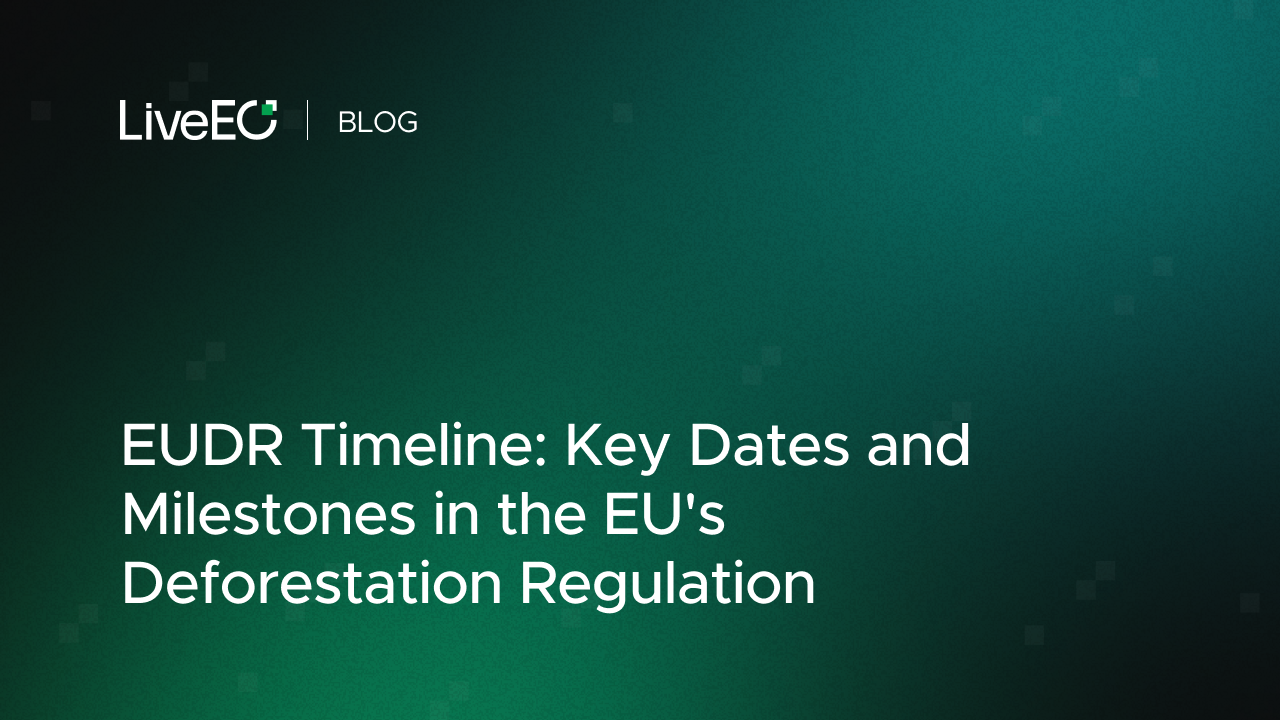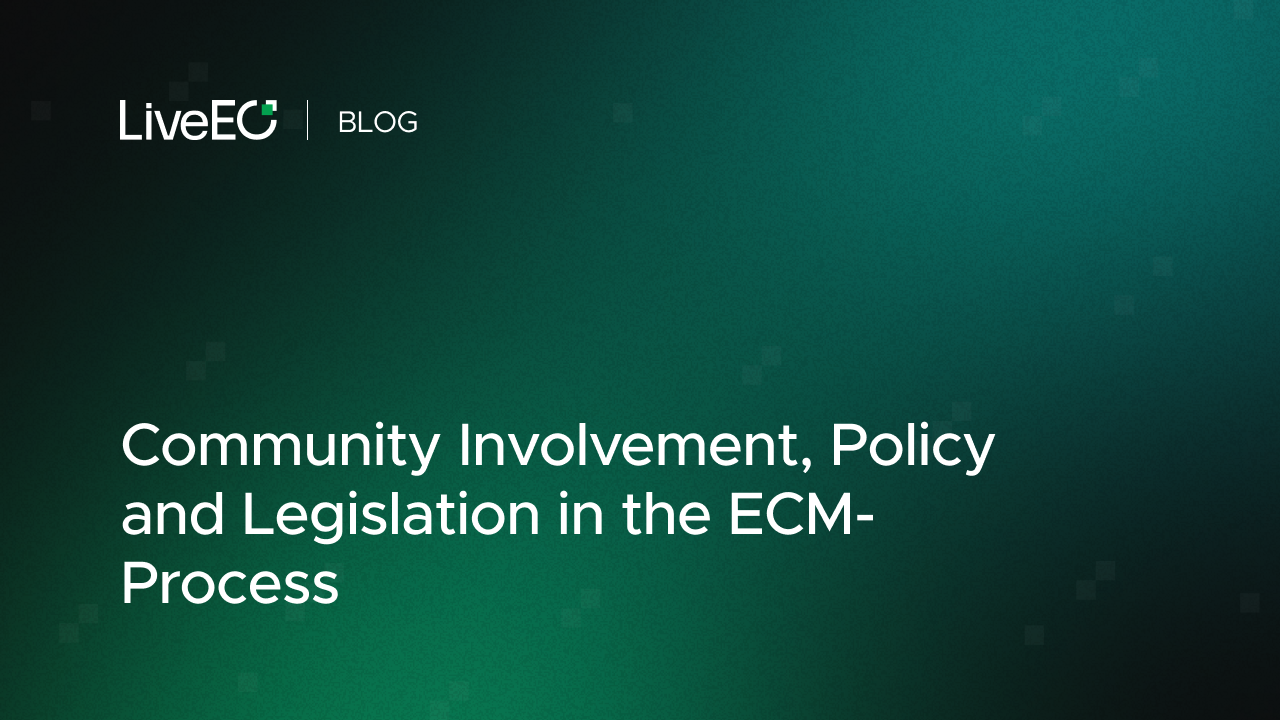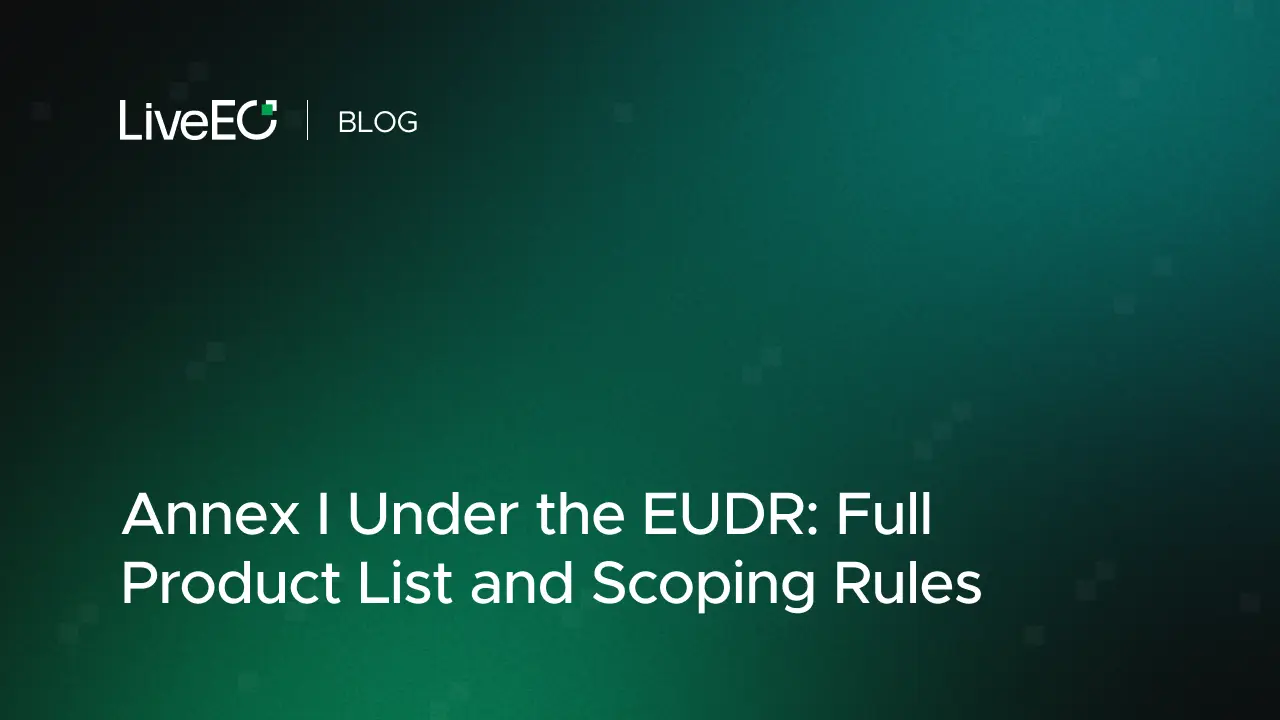.png)
As global efforts shift towards sustainable trade, the European Union's Deforestation Regulation (EUDR) emerges as a pioneering legislative and regulatory approach to combat deforestation and foster environmental preservation.
Understanding the EUDR's chronology is paramount for businesses striving for compliance.
This post explains the EU Regulation Deforestation's timeline, offering key insights into significant milestones within this vital piece of legislation.
Key Takeaways
- The European Union’s Deforestation Regulation (EUDR) is a critical element of the European Green Deal, aimed at mitigating deforestation and fostering sustainable trade.
- Adopted in December 2022 and in force since June 2023, the EUDR marks a significant step toward responsible supply chain management.
- Regulation (EU) 2025/2650 has firmly established the compliance deadlines as 30 December 2026 for large businesses and 30 June 2027 for micro and small undertakings.
- Businesses must submit a Due Diligence Statement that includes risk assessments and geolocation data to ensure deforestation-free production in their supply chains.
- The regulation targets key commodities, including soy, cattle, palm oil, coffee, cocoa, timber, and rubber, requiring strict compliance to sustainability standards.
- Recent updates provide additional guidance, including 40+ FAQs and the introduction of a country benchmarking methodology to assess deforestation risk by country.
- A simplification review is mandated by April 2026, while the general regulatory review has been rescheduled for 30 June 2030 to allow for an evaluation based on enforcement experience.
- Companies seeking compliance solutions should explore our comprehensive EUDR compliance tool, TradeAware. Learn more about how LiveEO can help your business meet EUDR requirements.
The idea behind the EU Deforestation Regulation
The conception of the EU Deforestation Regulation traces its roots back to longstanding concerns over the damaging environmental effects of deforestation.
In acknowledging the importance of forests in mitigating climate change, ensuring biodiversity, and facilitating socio-economic development, the EU deemed it necessary to take ambitious steps to counter global deforestation– thus, the birth of the EUDR.
This regulation represents a concrete action in line with the European Green Deal and is a cornerstone of the administrative strategy to prevent deforestation.
The EUDR came into force in June 2023. Since then, ongoing developments, including compliance deadlines and updated guidance, continue to refine its implementation for businesses.
Background and Purpose
The EU Deforestation Regulation (EUDR) is a landmark legislation aimed at curbing deforestation and promoting sustainable practices in supply chains.
As part of the European Green Deal, the EUDR represents a comprehensive effort to make Europe the first climate-neutral continent by 2050.
This regulation addresses the significant environmental and social impacts of deforestation, including biodiversity loss, climate change, and human rights abuses.
By regulating the trade of deforestation-related products, the EU aims to reduce its contribution to global deforestation and promote sustainable land use practices.
The EUDR is a crucial step in ensuring that supply chains are not only efficient but also environmentally responsible and socially equitable.
Scope and Coverage
The EUDR applies to a wide range of products, including palm oil, cattle, soy, coffee, cocoa, timber, rubber, and products derived from these commodities.
This regulation ensures that both EU-produced and imported products meet the same stringent sustainability standards. It covers all operators and traders doing business in the EU, regardless of their size or location.
While operators placing products on the market for the first time must exercise full due diligence, a new amendment simplifies obligations for downstream operators and traders. Regardless of size, downstream operators and traders are not required to submit due diligence statements. Instead, they must collect and transmit reference numbers to ensure traceability. Non-SME downstream operators and traders must still register in the information system.
Key Requirements and Obligations
The term ‘operator’ under the EUDR includes any natural or legal person engaged in commercial activities related to product distribution within the EU market, highlighting their responsibilities in compliance and due diligence.
The EUDR imposes several key requirements and obligations on operators and traders. These include conducting a risk assessment to identify potential deforestation risks in their supply chains and implementing a due diligence system to mitigate these risks to a negligible risk level.
Operators and traders must submit a due diligence statement to the EU authorities, keep records of their due diligence activities for at least five years, and make their due diligence statements publicly available.
Additionally, operators and traders must ensure that their products meet specific conditions: they must be produced in accordance with the relevant legislation of the country of production, not be associated with deforestation or forest degradation, and not be linked to human rights abuses.
The EUDR also requires operators and traders to provide geolocation data for their products, tracing them back to their original plots of land. This information is crucial for monitoring compliance with the regulation and preventing deforestation-related products from entering the EU market.
By adhering to these requirements, businesses can contribute to a more sustainable and ethical supply chain.
Implementation and Enforcement
The EU Deforestation Regulation (EUDR) will be implemented and enforced through a robust framework designed to ensure compliance and promote sustainable practices. Central to this framework are several key measures:
- Due Diligence Statements: Companies are required to submit due diligence statements to demonstrate their adherence to the EUDR. These statements must detail the steps taken to assess and mitigate risks of deforestation and forest degradation within their supply chains.
- Risk Assessment Criteria: Businesses must conduct thorough risk assessments to identify potential risks associated with deforestation and forest degradation. This involves evaluating the origins of relevant commodities and ensuring they meet the EUDR’s stringent standards.
- Relevant Commodities: The regulation applies to a wide range of commodities, including palm oil, soy, beef, wood, cocoa, coffee, and rubber. Companies dealing with these products must ensure they are sourced sustainably and are not linked to deforestation.
- Due Diligence Obligations: Companies must exercise due diligence to ensure their products do not contribute to deforestation or forest degradation. This includes verifying the legality of the commodities and their compliance with the EUDR.
- Risk Mitigation: Upon identifying risks, companies are required to implement effective risk mitigation measures. This could involve changing suppliers, improving traceability, or adopting more sustainable sourcing practices to address any identified risks.
By adhering to these measures, businesses can contribute to the EUDR’s goal of reducing deforestation and promoting sustainable supply chains.
The EU Deforestation and Forest Degradation Legislation Timeline: Key Dates
Key events within the broad EU Deforestation Legislation's timeline include:
June 2020
European Commission (EC) introduces a roadmap for feedback on the initiative to tackle global deforestation. This was the first step in the creation of the initiative, which sought to decrease greenhouse gas emissions and curb biodiversity loss.
December 2020
EC launches a public consultation on stepping up EU action against deforestation and forest degradation. EU citizens - 1.2 million - chipped in to give their opinion on the matter of dealing with deforestation, the 2nd biggest EU poll at the time.
A separate study also showed that EU citizens felt climate change was the one of the biggest issues their countries were facing.
October 2021
EC publishes the draft proposal. This replaced the previous EU Timber Regulation, but added soy, cattle, palm oil, coffee, and cocoa, given that these are primary contributors to the issue alongside wood.
The proposal also included critical measures like a cut-off date of December 2020, and the implementation of due diligence systems to ensure deforestation-free production, establishing the brunt of the regulation's framework, along with important details.
December 2021
EC approves the final text of the EUDR. This text of the proposed regulation was approved and submitted for adoption.
December 2022
The regulation is officially adopted. Following reviews, amendments, and negotiations by EU bodies, the EUDR was finally accepted, marking a significant step in forest conservation globally.
The text was more comprehensive, encompassing not just illegal deforestation, but also legal activities that contribute to deforestation.
June 2023
The regulation comes into force. It is now officially a requirement to comply with the regulation, with different dates depending on business size:
- Dec 2026
Compliance becomes mandatory for large and medium-sized operators, as well as downstream operators and traders who are not micro or small undertakings. They will be subject to checks and penalties for non-compliance from this date.
- June 2027
Micro and small undertakings (including micro or small primary operators) become officially liable.
December 2023
- The EC launches the EU Observatory on Deforestation and Forest Degradation, providing public access to forest cover data to support compliance efforts.
- A gap in compliance guidance cause uncertainty for businesses. As a result, industry groups like FEFAC and FEDIOL begin developing their own guidelines to support companies preparing for the EUDR.
March 2024
The EC starts finalizing the Information System, which will be used by companies to register their due diligence statements.
June 2024
- The EC releases initial hints of commodity-specific guidance, especially for complex products like rubber and timber, andclarifies issues around agroforestry and legality requirements.
- Work progresses on the country benchmarking methodology to classify countries by deforestation risk (low, standard, high), with the system expected to be completed by June 2025.
July 2024
The EC launches draft guidelines to address the complexities surrounding the management of products like rubber and timber.
August 2024
Pilot testing of the Information System intensifies, with over 100 companies participating. The system is set to become fully operational by November 2024.
{{inline}}
September 2024
The EC publishes updated FAQs, adding over 40 new answers to clarify traceability obligations, legality requirements, and penalties.
October 2024
- The EC proposes a 12-month extension for compliance deadlines, moving large businesses' compliance to December 30, 2025, and SMEs' to June 30, 2026, to address concerns about readiness.
- The EC releases additional guidance to further clarify traceability obligations, penalties, and key definitions like "forest degradation."
- The EC confirms that the Information System will begin accepting registrations for due diligence statements in November 2024, with full functionality by December.
November 2024:
- The EUDR Information System became available for operator registrations.
December 2024:
- The EUDR Information System was officially launched, allowing companies to submit and manage due diligence statements.
June 2025:
- Deadline for the European Commission to finalize the country benchmarking methodology, classifying countries as low-, standard-, or high-risk concerning deforestation.
December 2025:
- The European Parliament and Council adopted Regulation (EU) 2025/2650, officially delaying the general application date to 30 December 2026 and the date for micro and small undertakings to 30 June 2027.
December 30, 2026:
- Compliance deadline for medium and large enterprises to adhere to EUDR requirements.
June 30, 2027:
- Compliance deadline for micro and small enterprises to adhere to EUDR requirements.
Important Definitions: Relevant Commodities and other
Due Diligence Statement: This will be submitted to prove compliance. It should contain detailed insights into how the business has assessed, addressed, and mitigated risk in regards to the EUDR. A significant document, it should provide important details like geolocation information and transaction history in order to be approved for export/imports.
SMEs: Small & Medium Enterprises are businesses with less than 250 employees. Specifically, medium-sized businesses are defined as having less than 250 employees, and small businesses less than 50 (this means 249 and under, and 49 and under).
Large businesses: Also defined by their employee number size, these are companies with more than 250 employees.
Geolocation data: This refers to GPS coordinates tracing back commodities to their original plots of land.
Operator: A natural or legal person who, in the course of commercial activity, places relevant products on the market or exports them, excluding downstream operators.
Downstream Operator: A new category defined as a person who places on the market or exports products made using relevant products that are already covered by a due diligence statement. They do not submit their own due diligence statements but must pass on reference numbers.
Trader: Any person in the supply chain other than the operator or downstream operator who makes relevant products available on the market. Traders are no longer required to conduct due diligence or submit statements, but non-SME traders must register in the information system.
Deforestation: The conversion of a forest into a non-forest (such as a farm).
Relevant commodity: A commodity that falls under the scope of the EUDR and must comply with strict legal requirements to ensure it is deforestation-free and legally harvested. Operators must provide comprehensive documentation and proof of compliance regarding the relevant commodity, including its origin and production legality.
Forest degradation: The loss of a forest ecosystem's important biological qualities and processes, mainly due to logging.
Find more important definitions in our article 28 EUDR Definitions You Need to Know.
Impact on the EU Market
The EUDR is poised to significantly reshape the EU market, driving changes that extend beyond environmental benefits:
- Changes in Sourcing Practices: Companies will need to overhaul their sourcing practices to ensure compliance with the EUDR. This may involve seeking new suppliers, enhancing traceability, and adopting more sustainable procurement strategies.
- Increased Transparency: The regulation mandates greater transparency in supply chains. Companies must provide detailed information about the origins of their products and the steps taken to ensure they are deforestation-free. This increased transparency will foster greater accountability and trust among consumers and stakeholders.
- Improved Sustainability: By enforcing strict standards on deforestation and forest degradation, the EUDR is expected to drive significant improvements in sustainability. This will help reduce the EU’s environmental footprint and contribute to global efforts to combat climate change and biodiversity loss.
- Economic Benefits: Compliance with the EUDR can also yield economic benefits. Companies that adopt sustainable practices may gain a competitive edge, access new markets, and meet the growing demand for environmentally responsible products. This can enhance their reputation and drive long-term growth.
Overall, the EUDR will not only protect forests but also promote a more sustainable and competitive EU market.
Implications for Companies
The EUDR imposes several critical implications for companies operating within the EU market:
- Compliance Requirements: Companies must comply with the EUDR’s due diligence and risk assessment requirements. This involves conducting thorough evaluations of their supply chains and ensuring all products meet the regulation’s standards.
- Supply Chain Management: Effective supply chain management is crucial for compliance. Companies must ensure their supply chains are transparent, traceable, and free from deforestation-related risks. This may require investing in new technologies and processes to enhance supply chain visibility.
- Risk Management: Identifying and managing risks of deforestation and forest degradation is a key aspect of the EUDR. Companies must implement robust risk management strategies to address any potential issues and ensure their products are sustainably sourced.
- Transparency and Reporting: The EUDR requires companies to provide detailed transparency and reporting on their supply chains and sourcing practices. This includes submitting due diligence statements and making relevant information publicly available.
- Commercial Activity: The regulation applies to all companies engaged in commercial activity, including natural or legal persons. This means businesses of all sizes must adhere to the EUDR’s requirements, ensuring their operations do not contribute to deforestation.
By understanding and addressing these implications, companies can navigate the complexities of the EUDR and contribute to a more sustainable and responsible global trade environment.
Future Projections: Due Diligence Obligations
As the EU Deforestation Regulation (EUDR) continues to evolve, businesses must stay vigilant in adapting to new requirements.
Following the adoption of Regulation (EU) 2025/2650, the compliance deadlines have been finalized as 30 December 2026 for large companies and 30 June 2027 for micro and small undertakings.
This extension provides businesses with more time to prepare, but it also underscores the need for continuous engagement with regulatory updates.
The European Commission has recently released additional guidance to clarify crucial elements like traceability obligations and penalties, while the ongoing development of tools like the Information System and the country benchmarking methodology further supports compliance efforts.
These resources, expected to be fully operational by late 2024, will aid companies in managing their due diligence obligations effectively.
Looking forward, the Commission will present a simplification review report by 30 April 2026, while the first general review of the Regulation is scheduled for 30 June 2030.
Companies should remain proactive, implementing robust risk mitigation measures and closely following future guidance from the European Commission.
The coming years mark a critical shift towards sustainable trade practices, and companies that adopt strong compliance frameworks now will be better positioned to navigate this new regulatory landscape.
As the EUDR ushers in a new era of accountability, businesses must focus on building transparent and sustainable supply chains to meet the regulation’s objectives and avoid potential penalties.
In the meantime, companies are encouraged to explore compliance solutions like TradeAware, which streamlines due diligence processes, ensuring businesses meet EUDR requirements efficiently while contributing to global efforts to curb deforestation.
What Comes Next: Choosing the Right EUDR Compliance Solution
Now that you understand the EUDR timeline and compliance deadlines, the next step is implementing a software solution that can actually get you there. The regulation’s strict demands—like plot-level geolocation, risk assessments under Article 10, and digital Due Diligence Statements—require a platform that can manage complexity, scale globally, and stand up to regulatory scrutiny.
But with dozens of tools on the market, how do you separate robust compliance systems from overpromised features?
Our follow-up guide helps you evaluate exactly that. It covers must-have capabilities such as AI-powered deforestation detection, supplier onboarding workflows, ERP integration, and legal defensibility—plus it includes a downloadable RFP template tailored to EUDR.
Explore the full guide on how to choose an EUDR software vendor to ensure your solution meets today’s obligations and tomorrow’s enforcement realities.
Conclusion: A New Standard Set
Companies are now in a crucial stage of identifying potential solutions, like LiveEO's compliance tool. But most importantly, with deforestation posing significant threats to global biodiversity, climate stability, and sustainable development, the establishment of the EUDR marks a notable advancement in EU's environmental policy.
The unfolding timeline of the EU Deforestation Regulation clearly illustrates growing international commitment to reduce global deforestation.
As industry professionals in various countries affected by it (such as Thailand, Malaysia, Ghana, Brazil, and many more), recognizing the nuances of the EUDR's timeline is crucial in navigating the complexities of this new regulation and aligning business practices with these progressive environmental standards.











